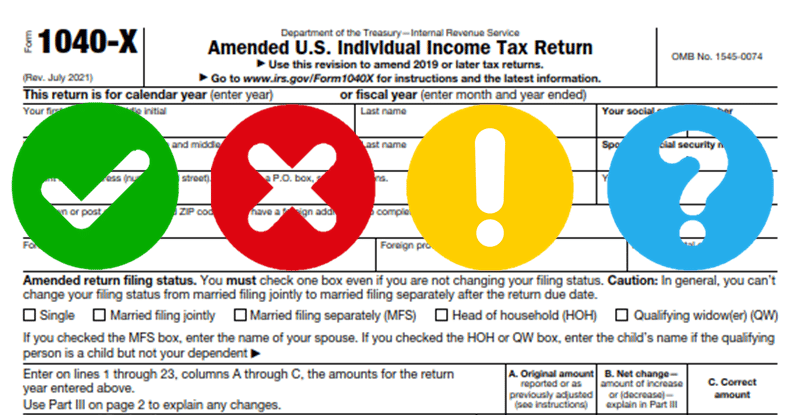For most individuals, the deadline for filing Form 1040, U.S. Individual Income Tax Return, is April 15th. Taxpayers who are unable to meet this date can request an extension to file (it does not delay the payment deadline) until October 15th.
However, after an individual tax return is filed, taxpayers still have an opportunity to make corrections by filing Form 1040-X, Amended U.S. Individual Income Tax Return. There are a variety of reasons that taxpayers could be in a position where filing an amended return is necessary. This post will explain these scenarios and review the steps to complete the process.
Correcting Reported Income
One reason that a taxpayer should amend his/her return is to update reported income. This update is necessary if a taxpayer receives a document that changes the amount of income that should be reported or contains unreported income. Discrepancies in income can occur due to reporting error, such as an amended form 1099 or a misreported W-2, which changes taxable income. Additionally, if a pass-through business entity that a taxpayer owns and interest in amends its return via Form 1065-X or Form 1120-X, then the business may issue an amended Schedule K-1, which reports updated business income from the flow-through entity. If taxpayers are sent an amended Schedule K-1, they should amend their personal returns to reflect this updated income.
When taxpayers receive any such documents, it is important file an amended return to correct the mistakes. Failure to amend to make a correction in taxable income may result in the IRS sending a CP2000 notice, which notifies taxpayers that their income has been adjusted and additional taxes may be due (as well as interest and penalties). Taxpayers who receive a CP2000 notice should abstain from filing an amended return at that point and, rather, respond directly to the notice.
Changing Filing Status
Another reason taxpayers may want to amend their returns is to change their taxpayer filing status to one that is more appropriate or advantageous. For example, a married couple can file separately or jointly, and may stand to claim specific deductions or fall into a more favorable tax bracket if they choose one status instead of the other. (see related post) A single person who meets certain requirements pertaining to supporting a dependent may be eligible to file as head-of-household, which provides more favorable tax brackets as well as a larger standard deduction, reducing the amount of taxes owed. If the advantage of filing under a different status was not considered on the original tax filing, taxpayers may want to amend their returns to gain these benefits.
Additional Reasons to Amend
The ability to claim certain tax credits can also be a reason to file an amended return. Tax credits are a dollar-for-dollar reduction of the individual’s tax liability, and some credits can even be used to produce or increase already-existing refunds. Tax returns can also be amended to include overlooked itemized deductions, such as mortgage interest, charitable contributions or medical expenses. Additionally, claiming a dependent can reduce tax liability as it provides additional opportunity to claim specific credits that otherwise would go unnoticed. If taxpayers realize that one of these situations applies to them, it may be worth filing Form 1040-X.
When Amended Returns Should Not Be Filed
If a taxpayer realizes that supporting documentation was not attached to the original return, that circumstance does NOT require the filing of an amended return. For example, a taxpayer who forgot to include his/her W-2 with the return, should NOT file Form 1040-X. The IRS will contact the taxpayer directly to request this information, and the taxpayer should follow the instructions included on that notice to submit it. Additionally, taxpayers should NOT file an amended return to correct mathematical errors. In such cases, the IRS will correct any errors and notify the taxpayer accordingly.
How to Amend a Tax Return
In order to amend a return for any of the reasons noted above, taxpayers will need to complete Form 1040-X. Forms 1040 and 1040-SR for tax years 2019, 2020, and 2021, can be amended electronically at this time. Amended returns for any other tax years or tax types must be filed by paper. Additionally, amended returns will need to be filed by mail for a prior year for which the original return was filed on paper during the current processing year.
When mailing in an amended return, the address used should be the one supplied for paper-filing the original return (this address can be found on the instructions for the 1040-X). However, if the return is being amended as a result of a notice from the IRS, it should be mailed directly to the address shown on the notice. Anyone amending returns for more than one year will need a separate form (mailed separately) for each year. If additional documents or schedules are needed to complete the amendment, they should be attached to Form 1040-X. For example, taxpayers who update their itemized deductions, should attach a new Schedule A.
To claim a refund for an amended return, Form 1040-X must be filed within three years from the filing date of the original return or two years from the date of tax payment, whichever is later. Taxpayers should wait until after they receive a refund from their original returns before filing an amended form. If a taxpayer owes more taxes due to an amended return, it is good practice to pay as soon as possible to minimize penalties and interest.
It may take up to 16 weeks for an amended return to be processed. Check online for status updates at “Where’s My Amended Return?” three weeks after the Form 1040-X is filed.
Final Thoughts
The reasons for filing an amendment can be complex, and the process of filing Form 1040-X often leads to confusion. When questions arise, it is best to seek professional assistance. For help filing an amended returns or with other tax issues, please reach out to Grossman Yanak & Ford LLP at 412-338-9300.
Additional IRS Resources






